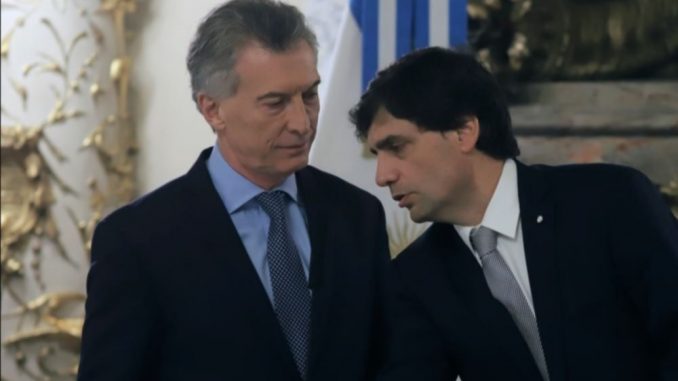
The announcement of minister Lacunza that they will not be paying over 100.000 millions of the debt irresponsibly taken by the government by its due date is barely a grudging recognition that the country can no longer bear this fraud. The international stock market reacted with a new fall of Argentinian bonds and shares, the country risk went over 2200 points and the raise of the dollar continued. The forecasts are that, with comings and goings, this trend will continue. Since there are no other simultaneous measures, specially a control of capitals to stop their flight and a control of the exchange market that can stop the dollar, the goal declared by the minister of preserving the reserves will not be fulfilled. The result will be the emptying of the reserves to maintain an “electoral” price of the dollar, with a new jump in capital flight, a brutal rise of inflation and a banking crisis with the economic crash that implies. Overall, it means a more brutal austerity plan for the working class.
The silence of Fernandez: who remains silent, speaks volumes
Frente de Todos candidate Alberto Fernández´s way of supporting the government´s measures, was to remain silent. This means that he chose not to speak about the minister´s measures. But it was not necessary, the previous day, one of Fernández´s main economic spokesmen, Guillermo Nielsen, had spoken for him. In an interview with a Brazilian news site, after a meeting of the PJ candidate with the IMF, which was immediately published by Clarín, Nielsen had advanced some key aspects of Fernández’s economic program: one of the main measures, though with another name, was this “reprofiling”. A renegotiation of the debt, with a free pass for pirate capitals to continue escaping until finishing off of what is left of the reserves. But the electoral game of “silence” that Alberto has chosen is a way to fulfil Macri’s request of not being left alone in this new twist in the looting of the country. One is trying not to risk votes and the other is trying to survive until the October elections, they remain associated in this looting policy, for now tacitly.
It is not electoral instability, it is a structural collapse
The crisis exploded in mid 2018, when the dollar rose from 20 to 40 pesos, revealing the unsustainability of the country´s sovereign debt. The agreement with the IMF, who gave Argentina the biggest loan in its history, had the goal of stabilizing that crisis, proving that it would support Macri in financing the flight of capitals, the payment of the debt that Lacunza is kicking forward today, and guaranteeing the exorbitant profits of the international and national financial system. But those funds were not enough to fulfil those goals. Almost 80% of them were taken out of the country as fast as the IMF´s payments came in. Out of 44.000 million dollars loaned by the organism, 36.000 million left through the revolving door that Fernandz says he would not stop. What the primaries elections proved, through its distorted electoral lens, is that the Argentinian people would not tolerate the structural reforms that Macri had promised, with which he hoped to obtain the resources to pay for the debt. So it was revealed to the “markets” that the debt was impossible to pay and that they had attempted to cover up the collapse with the IMF loan. The agreement that Macri and Fernandez reached on August 14 lasted just over a week, it broke when the government could no longer pay for the short-term debt.
But this is not about the market´s fear of Fernandez or Cristina Fernandez de Kirchner. What this is about is that, contrary to what minister Lacunza said on August 28, Argentina cannot face the debt´s commitments, not even after receiving the greatest loan in the IMF´s history. The problem is structural, of the Argentinian dependant capitalism and its pattern of accumulation of profit.
How to stop the collapse
That the elections are not the cause of the crisis does not mean that there are no responsibilities or politically responsible people nor that a political solution, with urgent economic measures is not needed. The plan that collapsed this time is the plan of Macri and the IMF, a program in favour of the most concentrated sectors of capital. It is mostly based on a monumental transference of resources from working people to privileged sectors and the deepening of the looting of the country´s natural resources.
Macri and the IMF must go now, the measures he has taken even after the primaries and until this last renegotiation of the debt are within the same parameters of that failed plan. This government and the Fund are an objective obstacle to stopping the collapse.
But it is not simply about advancing the presidential election. Because Fernández, more or less, with greater or lesser support of financial capital or the IMF itself (that the candidate does not repudiate), works closely with the same privileged sectors, as he said to the members of the Joint Board of Rural Associations, who visited him in his office on August 29, encouraging them to “work together”.
An immediate election to a Constituent Assembly will give the Argentinian people the possibility of debating and designing a new project for the country that begins with the repudiation of the external debt, the nationalization of the banking system in a state credit system controlled by its workers and audited by the people, the state monopoly of foreign trade and the design of an economic plan democratically built by workers and the people, that privileges the needs of the workers.
Carlos Carcione








